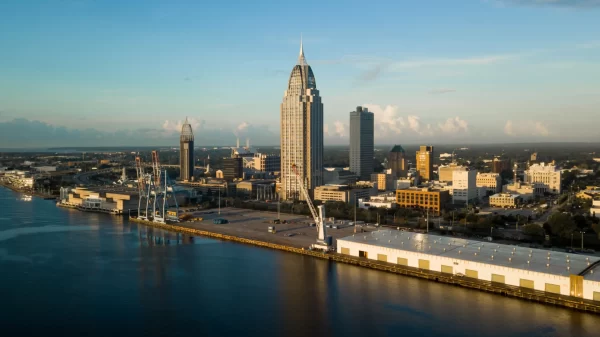By Brandon Moseley
Alabama Political Reporter
Tuesday, June 7, US Representative Gary Palmer (R-Hoover) announced that he had proposed an amendment to legislation on Puerto Rico that would exempt the island from the Jones Act. The Jones Act is also known as the Merchant Marine Act of 1920.
It requires that ships which transport goods from one port in the United States to another port in the United States be US-built, US-owned, and at least 75 percent US-crewed.
Congressman Palmer offered an amendment to HR5278, the Puerto Rico Oversight, Management, and Economic Stability Act (PROMESA), exempting Puerto Rico from the Jones Act.
Rep. Palmer said, “The Puerto Rico crisis is mostly one of Puerto Rico’s own making, but Congress is not blameless. We do need to act, but in a way that frees Puerto Rico from economy stifling regulations to the maximum extent possible to allow them to rebuild their economy. The Jones Act exemption helps Puerto Rico, a country with limited access to cheaper transportation such as trains or trucks, by reducing prices for goods transported by water. Two Puerto Rican economists found that from 1991-2010, the Jones Act cost Puerto Rican residents $16.4 billion. For example, a vehicle costs $6,000 more in Puerto Rico than on the mainland, and food is twice as expensive as in Florida.”
The US Virgin Islands were exempted from the Jones Act in 1992.
Rep. Palmer said, “Relief from the Jones Act would allow the cost of living in Puerto Rico to decline, allowing residents to stretch their wages further than before,” said Palmer. “If Congress wants to help Puerto Rico we must provide them with opportunities to better their economy and lower their cost of living, not bail them out without any forward thinking solutions.”
American shipping interests were not as pleased with the Palmer amendment.
The Shipbuilders Council of America (SCA) sent a statement to the Alabama Political Reporter. In it they claim that Alabama will lose job if Palmer’s amendment were to become law.
SCA President Max Paxton said, “We have supplier companies and shipyards like World Marine and BAE South that would bid on work for building and ship repair of Jones Act vessels servicing the Puerto Rico trade. Also, VT Halter Marine built and is building vessels for Puerto Rico and workers from Mobile definitely head over to Pascagoula MS to work in that shipyard.”- SCA President Matt Paxton (Thus, there would be direct impact on Alabama workers.).
According to the SCA, the shipyard industry (including shipyards and suppliers) provides 12,800 jobs and contributes over $953 million in GDP to the US economy from Alabama alone.
President Paxton wrote, “Given that the Jones Act and US shipyard industry support more than 12,800 jobs and contributes over $953 million in GDP to the U.S. economy from Alabama alone, we are disappointed that Rep. Palmer seems to be more focused on political maneuvering than on protecting our nation’s domestic and economic security. Exempting Puerto Rico from the Jones Act would do nothing to address island’s debt crisis and would actually jeopardize the more than $1 billion the US maritime industry has invested in the Puerto Rican shipping trade, as well as the thousands of good-paying jobs on the island..”
Heritage Foundation writer and free trade advocate Bryan Riley supports the Palmer amendent. Riley wrote in the ‘Daily Signal’: “Economists Anne O. Krueger, Ranjit Teja, and Andrew Wolfe concluded in 2015: “All islands, remote from the centers of economic activity, suffer from high transportation costs. But Puerto Rico does so disproportionately, with import costs at least twice as high as in neighboring islands on account of the Jones Act, which forces all shipping to and from U.S. ports to be conducted with US vessels and crews.”
The American Maritime Partnership (AMP), which identifies itself as the voice of the domestic maritime industry, released a statement opposing Rep. Gary Palmer’s (R-AL) proposed measure to exempt Puerto Rico from the Jones Act.
AMP Chairman Tom Allegretti said, “The Jones Act is not a cause for the island’s financial woes. While other industries have fled the island, the domestic maritime industry has made significant capital investments to service the economy and support thousands of family-wage jobs for Puerto Rican. Weakening the Jones Act would harm, not help, the Puerto Rican people and the Commonwealth’s economy. In fact, a vote against the Jones Act is a vote to outsource American jobs, undermine national security, and degrade homeland security.”
According to the AMP, shipping and shipbuilding are major industries in Alabama, which is a “top ten” shipyard state, with 12,800 jobs, according to a study by the US Maritime Administration. Shipbuilding provides $953 million in economic impact in Alabama each year with shipyard jobs paying well above national average wages.
Rep. Duncan Hunter, Chairman of the House Coast Guard and Maritime Transportation Subcommittee, said in a statement, “ It’s imperative not to conflate the unrelated issues of Puerto Rico’s debt and the Jones Act, and to fully grasp the importance of ensuring the safe transport of goods between American ports. There must also be acknowledgment of the dire consequences of exposing ports and waterways to foreign seafarers.”
The AMP claims that the Department of Defense (“DOD”), Navy, and Coast Guard are among the strongest supporters of the Jones Act because the military relies on the commercial maritime industry for its sealift capacity. They point to a US Government Accountability Office (GAO) study that warned that weakening the Jones Act could harm national security and a DOD estimate that it would cost of tens of billions a year for the Navy to replicate the benefits of the commercial maritime industry.
AMP also disputes the claim that changing the Jones Act in Puerto Rico will help the island. They claim that changes to the Jones Act in Puerto Rico would undermine national security, reduce border protection, and outsource American jobs. The GAO study on the Jones Act in Puerto Rico listed a number of potential harms to Puerto Rico itself if the Jones Act were changed, including the possible loss of the stable service the island currently enjoys under the Jones Act and the loss of jobs on the island. Moreover, American domestic carriers are making some of the largest private sector investments currently underway in Puerto Rico, spending nearly $1 billion in new vessels, equipment, and infrastructure.
The AMP argues that it is 40 percent more expensive to ship goods from the US mainland on foreign vessels to the US Virgin Islands (not subject to the Jones Act) than it is on Jones Act vessels to Puerto Rico. “since 1917, Puerto Rico has operated under a legal structure that generally makes US federal law automatically applicable in Puerto Rico, just as it would be in any American state. That is not true in the Virgin Islands. Also, importantly, the US Virgin Islands are outside the US customs territory while Puerto Rico and the United States are inside the US customs territory. Historically, the Jones Act has applied to US territories inside the US customs territory and not applied to those outside of it.”
They also dispute the claim that the Jones Act has undermined Puerto Rico’s efforts to import liquefied natural gas (LNG). AMP argues that American carriers pioneered the use of LNG in Puerto Rican markets, deploying the world’s first LNG-powered containerships and developing small-scale LNG supply and logistics services to help manufacturing and other industrial facilities on the island reduce the cost and improve the reliability of their energy supply. They claim that Puerto Rico’s real impediment is limited mainland US export facilities and import facilities on the island, infrastructure to utilize LNG on the island, and demand for bulk LNG. They claim that qualified American vessels are fully prepared to provide bulk LNG transportation services to the island.
The AMP says that nearly two-thirds of the vessels calling on Puerto Rico are already foreign.
Congressman Gary Palmer represents Alabama’s Sixth Congressional District.




















































